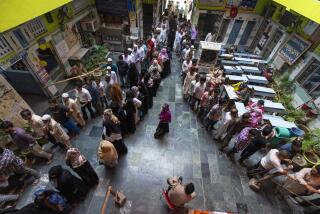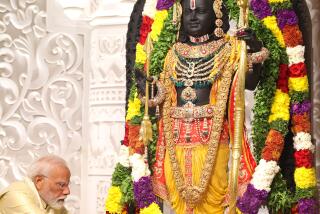For India’s Latest Premier, Term May Be All but Over
- Share via
NEW DELHI — For many Indians, their new prime minister is the best man for the job but comes from the worst party.
Atal Behari Vajpayee has less than two weeks to resolve the contradiction, or he will go down in history as India’s shortest-lived head of government, having foundered on the widespread unpopularity of his Hindu nationalist Bharatiya Janata Party.
A bachelor and an accomplished poet and cook, the silver-haired, black-browed Vajpayee, 69, is the moderate face of Hindutva, or political Hinduism. Decades ago, Indian leader Jawaharlal Nehru, sensing tremendous potential in the headmaster’s son from central India, introduced him as a future prime minister.
It may all be over by May 31. The hostile Congress (I) Party and a center-left alliance have vowed to torpedo Vajpayee’s 4-day-old premiership, calling the BJP’s cocktail of religion and politics a threat to the Indian republic’s secular underpinnings.
Vajpayee, BJP insiders say, was a reluctant political warrior. Even on the eve of his swearing-in Thursday, he was conscious of his wafer-thin chances of quickly forging a majority in a deadlocked Parliament where his party is largely friendless.
But few who know him doubt his resolve, abilities--and charm.
“A man should struggle, fight with the circumstances,” Vajpayee wrote in one of his Hindi poems. “If one dream fades, he should make another.”
V. B. Singh, co-author of “Hindu Nationalists in India: the Rise of the Bharatiya Janata Party,” said the new government holds a minority in the Lok Sabha, Parliament’s lower house, but that the personal standing of its leader could still tip the balance in its favor.
“Vajpayee has to act more as Vajpayee and less as the representative of his party,” said Singh, senior researcher at the Center for the Study of Developing Societies in New Delhi.
Available evidence shows that many Indians agree. A recent Times of India poll found that Vajpayee would be the most popular pick for the prime minister’s job. An opinion sampling in eight cities found 50% of the respondents preferred Vajpayee, though his party netted 23% of the popular vote in the parliamentary elections.
“I’m quite misfit for the job,” Vajpayee joked during a preelection meeting with foreign correspondents. In a more serious vein, he evoked his most precious political asset: “As far as I am concerned, I am acceptable to all sections of the country.”
Long one of India’s best stump speakers, Vajpayee is starting his seventh term in the Lok Sabha, the more important of the two parliamentary chambers. In July 1993, he became leader of the parliamentary opposition and traveled to Geneva to help argue India’s case against Pakistani charges of human rights abuses in Kashmir.
That trip was proof of the esteem and trust Vajpayee enjoyed among his colleagues in the then-ruling Congress Party. The next year, he received an award as the best member of Parliament.
Born on Christmas Day 1926 in Gwalior in central India, Vajpayee, one of seven children in a scholarly Brahman family, entered Lucknow University to study law but quit early to enlist in the freedom movement.
He joined the Indian National Congress for one year and was jailed by the British for 24 days for participating in Mohandas K. Gandhi’s “Quit India” movement. (He would be thrown into jail again years later during the state of emergency declared by Nehru’s daughter and successor, Indira Gandhi.)
Vajpayee was first elected to Parliament in 1957, at the age of 30, on the ticket of the Jana Sangh, the BJP’s ancestor. In 1977, after Congress’ 30-year lock on power was broken for the first time, he became foreign minister, and is remembered for having improved relations markedly with Pakistan and other neighboring countries.
In an age when corruption has come to pervade Indian politics, Vajpayee is considered a refreshing exception. Lal Krishna Advani, the BJP’s president, resigned from Parliament in protest this year after being implicated in an $18-million payoff scandal that cut across party lines. No such cloud hangs over Vajpayee.
As a youth, India’s prime minister joined the paramilitary National Volunteer Corps and regularly took part in drills. In 1948, when the group was briefly banned as a dangerous organization, Vajpayee escaped from Lucknow, where he was editing a corps newspaper, to Allahabad, where he started another. When the BJP was formed, in 1980, Vajpayee served as party president for the first six years.
His frank views have often clashed with those of his party. Vajpayee didn’t hesitate to praise Indira Gandhi for sending the army in 1971 to help Bangladesh secede from Pakistan. When Hindu throngs destroyed a crumbling mosque in Ayodhya, in Uttar Pradesh state, in 1992 so a temple to their god-king Ram could be built, he reacted with immediate anguish, unlike many other BJP leaders.
Some Indians theorize that Vajpayee is only the “happy face” worn by Hindu nationalists to worm their way into power. Vajpayee told the foreign correspondents that he has “very friendly relations” with the National Volunteer Corps but feels free to reject their advice.
More to Read
Sign up for Essential California
The most important California stories and recommendations in your inbox every morning.
You may occasionally receive promotional content from the Los Angeles Times.













